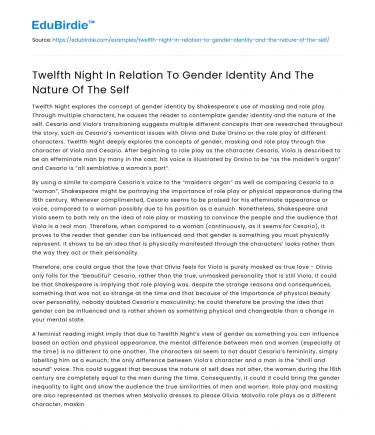Twelfth Night explores the concept of gender identity by Shakespeare’s use of masking and role play. Through multiple characters, he causes the reader to contemplate gender identity and the nature of the self. Cesario and Viola’s transitioning suggests multiple different concepts that are researched throughout the story, such as Cesario’s romantical issues with Olivia and Duke Orsino or the role play of different characters. Twelfth Night deeply explores the concepts of gender, masking and role play through the character of Viola and Cesario. After beginning to role play as the character Cesario, Viola is described to be an effeminate man by many in the cast; his voice is illustrated by Orsino to be “as the maiden’s organ” and Cesario is “all semblative a woman’s part”.
By using a simile to compare Cesario’s voice to the “maiden’s organ” as well as comparing Cesario to a “woman”, Shakespeare might be portraying the importance of role play or physical appearance during the 16th century. Whenever complimented, Cesario seems to be praised for his effeminate appearance or voice, compared to a woman possibly due to his position as a eunuch. Nonetheless, Shakespeare and Viola seem to both rely on the idea of role play or masking to convince the people and the audience that Viola is a real man. Therefore, when compared to a woman (continuously, as it seems for Cesario), it proves to the reader that gender can be influenced and that gender is something you must physically represent. It shows to be an idea that is physically manifested through the characters’ looks rather than the way they act or their personality.
Save your time!
We can take care of your essay
- Proper editing and formatting
- Free revision, title page, and bibliography
- Flexible prices and money-back guarantee
Therefore, one could argue that the love that Olivia feels for Viola is purely masked as true love - Olivia only falls for the “beautiful” Cesario, rather than the true, unmasked personality that is still Viola. It could be that Shakespeare is implying that role playing was, despite the strange reasons and consequences, something that was not so strange at the time and that because of the importance of physical beauty over personality, nobody doubted Cesario’s masculinity; he could therefore be proving the idea that gender can be influenced and is rather shown as something physical and changeable than a change in your mental state.
A feminist reading might imply that due to Twelfth Night’s view of gender as something you can influence based on action and physical appearance, the mental difference between men and women (especially at the time) is no different to one another. The characters all seem to not doubt Cesario’s femininity, simply labelling him as a eunuch; the only difference between Viola’s character and a man is the “shrill and sound” voice. This could suggest that because the nature of self does not alter, the women during the 16th century are completely equal to the men during the time. Consequently, it could it could bring the gender inequality to light and show the audience the true similarities of men and women. Role play and masking are also represented as themes when Malvolio dresses to please Olivia. Malvolio role plays as a different character, masking his true self with “yellow stockings” and “cross-gartered” dressing.
This role play could have been used to encourage the audience and Malvolio of his social standing; during the Elizabethan era, the color “yellow” was used as a symbol to represent social status and wealth. Twelfth Night could be using a symbol to suggest how truly essential wealth and social status is; it can even be symbolized through something as simple as the color “yellow”. Shakespeare could be pairing the use of the color “yellow” with “cross-gartered” to symbolize Malvolio’s role play in terms with his nature of self - perhaps he feels insecure of himself and decides to mask his true self and his masculinity by dressing differently for Olivia.
Malvolio is presented as someone who wants to climb up the social ladder; he, however, seems to change himself completely to receive the unrequited love he craves from Olivia and starts to role play as a different character. However, his misunderstanding of his change in personality might imply that he is masking areas of himself to appear as a better man, either socially or personally. This could be due to his incertitude in his current life and the self-consciousness he feels; rendering him to change his appearance and influence his current life through a change in physical appearance. Twelfth Night could be suggesting that the importance given to social values and the power given to society influences and causes even sure characters such as Malvolio to waver and become insecure in their own self. Malvolio continues to attempt to woo Olivia and gain a higher social status by changing his true self and true nature through masking and role play.
Shakespeare explore concepts of the true self and gender ambiguity through the different characters. By expressing his ideas and values about gender, role playing and the nature of self, the audience has a deeper understanding of the true historical and societal meanings during the Elizabethan era. Although these characters explore different points of views on the matter, the fundamental idea remains the same; forming the base of Shakespeare’s “Twelfth Night”. 9.5 Aim to: -use connectives which tell the examiner that you are dealing with alternative interpretations: although, however, alternatively, on the other hand, whereas, in contrast -all texts deal with contrast and juxtaposition or point out similarities – use these words.






 Stuck on your essay?
Stuck on your essay?

